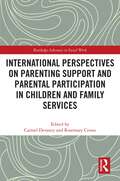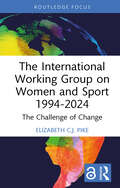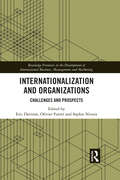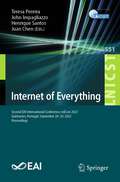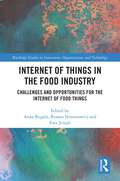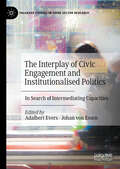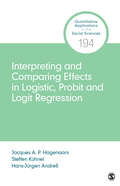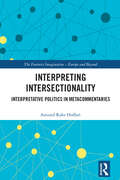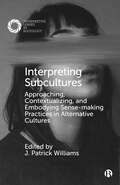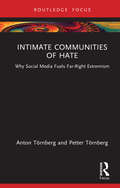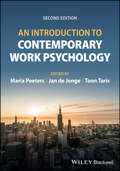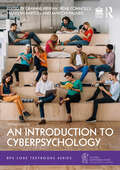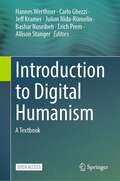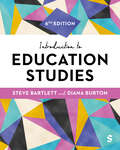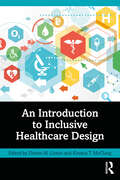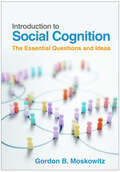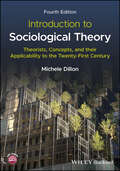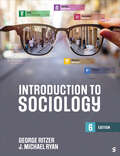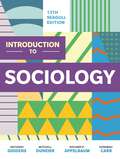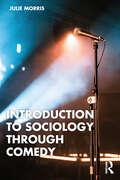- Table View
- List View
International Perspectives on Parenting Support and Parental Participation in Children and Family Services (Routledge Advances in Social Work)
by Carmel Devaney Rosemary CrosseThis book provides an account of parenting support initiatives in children and family services from a number of jurisdictions, paying particular attention to their impact on both ‘hard’ and ‘soft’ outcomes for participants and to the inclusion of parents in the design and delivery of these supports. By focusing on parents who are experiencing challenges outside of the normal day-to-day task of parenting and in receipt of formal support services, their perspectives on the experience of receiving these supports and the difference experienced by children and family members are analysed. Conceptually driven and reflecting the individual theories and frameworks that underpinned the parenting supports, the participatory processes and the research undertaken, this book includes case studies from Australia, Bulgaria, England, Italy, Ireland, Northern Ireland, Norway, Poland, Portugal, Scotland, Serbia and Spain. By highlighting the theoretical, conceptual and practical considerations required when supporting parents in an inclusive manner, it will be of interest to all scholars, students and practitioners working in the following areas: social work and social care, child development, child protection and social policy.
The International Working Group on Women and Sport 1994-2024: The Challenge of Change (ISSN)
by Elizabeth C.J. PikeThis book comprehensively evaluates the role of the International Working Group on Women and Sport (IWG) – the world’s largest network dedicated to advancing gender equity and equality in sport, physical education, and physical activity – in influencing global and domestic policy and practice.The issues addressed by the IWG in its first three decades of activism reflect global socio-political progress, as well as emergent new problems, for women, sport, and human rights. The IWG’s commitment to collaboration with, among others, the International Olympic Committee and the United Nations has provided the foundations for globally accepted frameworks to address gender-based issues in and through sport. The advocacy work of the IWG is told via first-hand interviews with key personnel from each of the IWG Secretariats, from its establishment in 1994 to 2024, providing insight into the most significant issues, achievements, and outcomes for the international social movement for women and sport.The book is a useful resource for students in the sociology of sport, sport policy, leadership, management, coaching, and gender studies. It is also relevant to sport administrators, practitioners, policymakers, and those working in gender governance.
Internationalization and Organizations: Challenges and Prospects (Routledge Frontiers in the Development of International Business, Management and Marketing)
by Eric Davoine Olivier Furrer Sophie NivoixTo fill in the gap in theoretical and empirical aspects in the existing international management literature, the book covers a broad variety of issues relating to the challenges facing companies after the recent worldwide crises of financial, sanitary, and geopolitical nature. The book offers an overview of these challenges along three axes: the challenges related to the processes of adapting to the international environment, the challenges affecting the actors of internationalization, and finally the challenges related to the specifics of the international context.The book aims to offer a comprehensive analysis of the theoretical and practical attributes related to the adaptation processes in international business, the cultural evolutions of actors, and the changes in the international environment. It also seeks to help managers and scholars alike to better understand the new challenges in diverse aspects pertaining to international management.To cover these issues, the book addresses topics, which up till now have not been investigated in depth or have not been researched at all. It includes both theoretical and managerial viewpoints and various international examples.
Internet of Everything: Second EAI International Conference, IoECon 2023, Guimarães, Portugal, September 28-29, 2023, Proceedings (Lecture Notes of the Institute for Computer Sciences, Social Informatics and Telecommunications Engineering #551)
by Teresa Pereira John Impagliazzo Henrique Santos Juan ChenThis book constitutes the refereed post-conference proceedings of the Second International Conference on Internet of Everything, IoECon 2023, which took place in Guimarães, Portugal, in September 2023. IoECon 2023 presents IoT paradigms to their whole dimension, intelligently connecting devices, people, processes, data, and things. IoE is multi-disciplinary and offers an opportunity to explore the co-relations between different areas, techniques, and theories about a new cyber world. The 11 revised full papers were carefully reviewed and selected from 38 submissions. The papers focus on a complete ecosystem that digitally interconnects everything, including people-to-people, people to-machines, and machines-to-machines.
Internet of Things in the Food Industry: Challenges and Opportunities for the Internet of Food Things (Routledge Studies in Innovation, Organizations and Technology)
by Anna RogalaThe food industry is experiencing a digital transformation across the entire supply chain, from farm to fork. This book offers comprehensive insights into the challenges and opportunities faced, specifically examining the application of the Internet of Things. The authors analyse the benefits and the related threats from the perspective of the participants of the entire supply chain, including consumers. Taking the reader on a journey, this book begins with an analysis of technology use in farming, production, logistics and retailing before delving into the use of digitalization in educating consumers on sustainable consumption practices. The multifaceted analysis of the Internet of Food potential combines science and practice, enriching theoretical analysis with case studies. This book will be of interest to those researching and studying supply chain management, logistics, innovation and technology management and consumption, with a particular interest in the food industry.
The Interplay of Civic Engagement and Institutionalised Politics: In Search of Intermediating Capacities (Palgrave Studies in Third Sector Research)
by Adalbert Evers Johan Von EssenThis volume focusses on the interplay of civic engagement and institutionalised politics and its role in both the erosion and retrieval of intermediate capabilities and procedures. Rather than discussing democracy as a relationship between citizens as individual voters and state power, the book studies the relationship between citizens engaged in or through organisations, movements and networks in civil society, and their impact in the context of institutionalised politics, be that through representative institutions and political parties or participation in administrative governance. The aim of this volume is to renew the scholarly discussion on the prospects of liberal democracy by looking for opportunities to curb antagonisms and instead strengthen intermediary capabilities. The book will therefore be of interest to students in relevant disciplines as political science, civil society research, sociology, and research on social movements. Chapter 1 and Chapter 10 are available open access under a Creative Commons Attribution 4.0 International License via link.springer.com.
Interpreting and Comparing Effects in Logistic, Probit, and Logit Regression (Quantitative Applications in the Social Sciences)
by Jacques A. Hagenaars Steffen Kuhnel Hans-Jurgen AndressLog-linear, logit and logistic regression models are the most common ways of analyzing data when (at least) the dependent variable is categorical. This volume shows how to compare coefficient estimates from regression models for categorical dependent variables in three typical research situations: (i) within one equation, (ii) between identical equations estimated in different subgroups, and (iii) between nested equations. Each of these three kinds of comparisons brings along its own particular form of comparison problems. Further, in all three areas, the precise nature of comparison problems in logistic regression depends on how the logistic regression model is looked at and how the effects of the independent variables are computed. This volume presents a practical, unified treatment of these problems, and considers the advantages and disadvantages of each approach, and when to use them, so that applied researchers can make the best choice related to their research problem. The techniques are illustrated with data from simulation experiments and from publicly available surveys. The datasets, along with Stata syntax, are available on a companion website at: https://study.sagepub.com/researchmethods/qass/hagenaars-interpreting-effects.
Interpreting and Comparing Effects in Logistic, Probit, and Logit Regression (Quantitative Applications in the Social Sciences)
by Jacques A. Hagenaars Steffen Kuhnel Hans-Jurgen AndressLog-linear, logit and logistic regression models are the most common ways of analyzing data when (at least) the dependent variable is categorical. This volume shows how to compare coefficient estimates from regression models for categorical dependent variables in three typical research situations: (i) within one equation, (ii) between identical equations estimated in different subgroups, and (iii) between nested equations. Each of these three kinds of comparisons brings along its own particular form of comparison problems. Further, in all three areas, the precise nature of comparison problems in logistic regression depends on how the logistic regression model is looked at and how the effects of the independent variables are computed. This volume presents a practical, unified treatment of these problems, and considers the advantages and disadvantages of each approach, and when to use them, so that applied researchers can make the best choice related to their research problem. The techniques are illustrated with data from simulation experiments and from publicly available surveys. The datasets, along with Stata syntax, are available on a companion website at: https://study.sagepub.com/researchmethods/qass/hagenaars-interpreting-effects.
Interpreting Intersectionality: Interpretative Politics in Metacommentaries (The Feminist Imagination - Europe and Beyond)
by Amund Rake HoffartAgainst the backdrop of the emergence of intersectionality as a dominant paradigm in feminist scholarship and activism, this book explores the genre of metacommentaries as critical responses to the development of intersectionality as a paradigm. With attention to the dispersal of intersectionality into ever-newer contexts – and the missteps and breakdowns that occur during this process – it addresses the concern that intersectionality is transforming into something unrecognisable, drifting too far away from its foundational sources and visions and becoming diluted by its expansion. Examining the process by which metacommentaries engage in a form of corrective storytelling – seeking to rescue intersectionality from misuse by pinning it down and returning it to where it belongs – Interpreting Intersectionality presents a critique of these gestures of correction, arguing that, far from reconnecting intersectionality with its roots and enabling it to realise its potential, such metacommentaries actually bind the scholarly discourse on intersectionality to an either/or argumentative dynamic. It will therefore appeal to scholars and students with an interest in feminist theory, gender studies and/or intersectional analysis.
Interpreting Subcultures: Approaching, Contextualizing, and Embodying Sense-Making Practices in Alternative Cultures
by J. Patrick WilliamsThe concept of ’subculture’ is an invaluable tool to frame the study of non-normative and marginal cultures for social and cultural scholars. This international collection uncovers the significance of meaning-making in the processes of defining, studying and analyzing subcultural phenomena. Examining various dimensions of interpretivism, the book focuses on overarching concerns related to interpretation as well as day-to-day considerations that affect researchers’ and members’ interpretations of subcultural phenomena. It reveals how and why people use specific conceptual frames or methods and how those shape their interpretations of everyday realities. This is an unprecedented contribution to the field, explaining the interpretive processes through which people make sense of subcultural phenomena.
Interviews und audiovisueller Essayismus Alexander Kluges: Ein ästhetisch-performatives Bildungsprojekt und seine Relevanz für den Philosophie- und Ethikunterricht (Ethik und Bildung)
by Florian WobserDieser Band entwickelt eine "mediensensible" Fachdidaktik Philosophie/Ethik. In Bezug auf die Lebenswelt der Schüler*innen werden Unterhaltungen und Kunstfilme des Medienphilosophen Alexander Kluge auf dessen Web-TV dctp.tv für eine philosophisch-ethische Bildung wahrnehmbar und denkbar. Kluges audiovisuelle Clips werden als Unterrichtsmedien ernst genommen, ihre Bild- und Tonspur(en) didaktisch gewürdigt. Das Montieren diskursiver und präsentativer Elemente ermöglicht zugleich eine medienphilosophiedidaktische Propädeutik zugunsten des Umgangs mit anderen Web-Inhalten (etwa auf YouTube).
Intimate Communities of Hate: Why Social Media Fuels Far-Right Extremism (Routledge Studies in Political Sociology)
by Anton Törnberg Petter TörnbergSocial media has fundamentally transformed political life, driving a surge in far-right extremism. In recent years, radical anti-democratic ideologies have entered into the political mainstream, fueled by energy from extreme online environments. But why do far-right extremist movements seem to thrive so well on social media platforms? What takes place within the fringe online spaces that seem to function as incubators for violent extremists? To answer these questions, this book goes inside the “murder capital of the racist Internet”, examining 20 years of conversations on Stormfront.org. Using a combination of computational text analysis and close reading, we seek a deeper understanding of the emotional and social effects of being part of an extremist community. We lay the foundation of a new way of understanding online extremism, building on the tradition of Émile Durkheim and Randall Collins. We find that online radicalization is not merely an effect of repeated one-sided arguments, as suggested by metaphors such as “echo chambers”. Instead, social media politics can be better understood through Durkheim’s concept of rituals: moments of shared attention and emotion that create emotional energy and a sense of intersubjectivity, weaving from participants a political tribe – united, energized, and poised to act.
Intimate Relationships: Issues, Theories, and Research
by Ralph Erber Maureen Wang ErberThe fourth edition of this bestselling textbook offers a comprehensive examination of intimate relationships. It covers classic and contemporary scholarship of the psychology of relationships, presenting the material in an engaging and rigorous manner.The book covers a range of themes to explore the multifaceted dimensions of relationships, from the evolution of attraction and love to the intricacies of attachment and complexities of jealousy. Written in a warm and personal voice, each chapter features real-life stories to stir readers’ engagement, while critical thinking prompts encourage reflection on both the presented issues and theories. Adopting an interdisciplinary perspective firmly anchored in research, this new edition stays abreast of the evolving landscape of relationship science. It has been carefully updated to present the latest findings and includes new material on intriguing subjects such as sexual pathways, online dating, the far-reaching impact of COVID-19, open science, and the diverse fabric of 21st century relationships - including interracial and LGBTQ+ dynamics, cohabitation, and singlehood.Written for students and any reader keen on understanding the intricacies of romantic relationships, Intimate Relationships is ideal reading for undergraduate students of psychology, sociology, and related disciplines, or as an enriching supplement for graduate studies.
An Introduction to Contemporary Work Psychology
by Maria C. W. Peeters Jan De Jonge Toon TarisAN INTRODUCTION TO CONTEMPORARY WORK PSYCHOLOGY A fully updated edition of the definitive textbook Work psychology is the study of work behavior and the psychological dimensions that both produce and result from it. It has developed in recent decades into a field that takes a comprehensive view of 21st century workers and their psychological context and condition. Now fully updated to reflect the latest research and practical insights, it promises to continue as an indispensable resource for advanced courses in work psychology. Readers of the second edition of An Introduction to Contemporary Work Psychology will find: Chapters written by a global team of experts Overview of classic and current theories that comprise Work Psychology Detailed discussion of topics such as leadership, emotion work, sustainable careers, job crafting and the future of work A unique focus on positive aspects of work, including motivation, engagement, personal resources and positive workplace interventions An Introduction to Contemporary Work Psychology is ideal for advanced undergraduate and graduate students enrolled in work psychology courses, as well as for students or researchers looking for a reference or introduction to the subject. “Understanding work from various psychological perspectives has become highly relevant for all those involved and interested in the diverse and changing nature of work-life. This book is a treasury of what is important to know of current work psychology. It is timely, comprehensive, and enjoyable reading. Editors and authors have done great job and now it is time for readers to enjoy this book and its many perspectives to the world of contemporary work and organizational psychology.” —Jari Hakanen, PhD, Research professor, Finnish Institute of Occupational Health
An Introduction to Cyberpsychology (BPS Core Textbooks Series)
by Gráinne Kirwan, Irene Connolly, Hannah Barton, and Marion PalmerAn Introduction to Cyberpsychology provides a comprehensive introduction to this rapidly growing discipline. Fully updated in its second edition, the book encourages students to critically evaluate the psychology of online interactions and to develop appropriate research methodologies to complete their own work in this field.The book examines cyberpsychology and online research methodologies, social psychology in an online context, practical applications of cyberpsychology, and the psychological aspects of other technologies. This new edition has been carefully updated to include additional coverage of: Expanded content relating to major developments in the field and new content on gaming and screentime A new chapter examining the relationship between older adults and technology Cyberpsychology in focus feature boxes in each chapter that examine topics in depth Interviews with professionals working in fields relating to cyberpsychology Each chapter includes key terms and a glossary, content summaries, discussion questions, and recommended reading to guide further study.Supported by extensive online resources for students and instructors, this authoritative book is an essential core text for undergraduate modules in cyberpsychology, and an ideal primer for students of postgraduate programs in cyberpsychology.To view the additional student and instructor resources for this book, please visit bpscoretextbooks.routledge.com
Introduction to Digital Humanism: A Textbook
by Hannes Werthner Carlo Ghezzi Jeff Kramer Julian Nida-Rümelin Bashar Nuseibeh Erich Prem Allison StangerThis open access textbook introduces and defines digital humanism from a diverse range of disciplines. Following the 2019 Vienna Manifesto, the book calls for a digital humanism that describes, analyzes, and, most importantly, influences the complex interplay of technology and humankind, for a better society and life, fully respecting universal human rights. The book is organized in three parts: Part I “Background” provides the multidisciplinary background needed to understand digital humanism in its philosophical, cultural, technological, historical, social, and economic dimensions. The goal is to present the necessary knowledge upon which an effective interdisciplinary discourse on digital humanism can be founded. Part II “Digital Humanism – a System’s View” focuses on an in-depth presentation and discussion of the main digital humanism concerns arising in current digital systems. The goal of this part is to make readers aware and sensitive to these issues, including e.g. the control and autonomy of AI systems, privacy and security, and the role of governance. Part III “Critical and Societal Issues of Digital Systems” delves into critical societal issues raised by advances of digital technologies. While the public debate in the past has often focused on them separately, especially when they became visible through sensational events the aim here is to shed light on the entire landscape and show their interconnected relationships. This includes issues such as AI and ethics, fairness and bias, privacy and surveillance, platform power and democracy. This textbook is intended for students, teachers, and policy makers interested in digital humanism. It is designed for stand-alone and for complementary courses in computer science, or curricula in science, engineering, humanities and social sciences. Each chapter includes questions for students and an annotated reading list to dive deeper into the associated chapter material. The book aims to provide readers with as wide an exposure as possible to digital advances and their consequences for humanity. It includes constructive ideas and approaches that seek to ensure that our collective digital future is determined through human agency.
Introduction to Education Studies
by Steve Bartlett Diana M BurtonIn this fully updated sixth edition of this much-loved textbook, students will be introduced to different ways of looking at education, supported by links to classic and contemporary research. Built around the essential themes of psychology, history, policy and sociology, this new edition explores a range of contemporary topics found on Education studies courses, including: UK education policy since 2020, including policy responses to the COVID-19 pandemic Decolonising the curriculum and social justice Education studies and student employability Expanded coverage of cognitive psychological theories of learning
Introduction to Education Studies
by Steve Bartlett Diana M BurtonIn this fully updated sixth edition of this much-loved textbook, students will be introduced to different ways of looking at education, supported by links to classic and contemporary research. Built around the essential themes of psychology, history, policy and sociology, this new edition explores a range of contemporary topics found on Education studies courses, including: UK education policy since 2020, including policy responses to the COVID-19 pandemic Decolonising the curriculum and social justice Education studies and student employability Expanded coverage of cognitive psychological theories of learning
An Introduction to Inclusive Healthcare Design
by Denise M. Linton Kiwana T. McClungAn Introduction to Inclusive Healthcare Design is a comprehensive guide to the design and facilitation of safe, healthy, equitable, and inclusive healthcare settings across a variety of scales. The book informs healthcare professionals, healthcare administrators, planners, designers in the healthcare sector, design students, and faculty about best practices and considerations for inclusive design.The primary theme for the book is design for all – considering the design of healthcare spaces through the lenses of inclusivity and social equity. Part 1 presents the reader with an overview of the variety of locations and types of healthcare settings. Part 2 provides a comprehensive overview of the principles of equitable and inclusive healthcare design and considers how these principles can be applied to the range of settings laid out in Part 1. The authors consider inclusivity-supportive infrastructure in primary and ancillary spaces within healthcare settings. Part 3 envisions the future of inclusive healthcare design, considering the integration of virtual reality and artificial intelligence, as well as addressing the ever more relevant issue of healthcare provision in settings at risk of natural disasters.
Introduction to Social Cognition: The Essential Questions and Ideas
by Gordon B. MoskowitzWhy are first impressions so powerful? How do we &“know&” what others are like when we cannot read their minds? How can scientists measure biases that people do not want to admit--or do not know they have? This engaging text delves into social cognition by exploring major questions in the field through an everyday lens. Students are introduced to core concepts and processes pertaining to how people come to know themselves and understand the behavior of others. Classic and contemporary findings and experimental methods are explained. The text connects the research to pressing contemporary problems--the roots of political polarization, why even rational people fall prey to misinformation, and the best ways to reduce prejudice. Boxed definitions of key terms are included throughout.
Introduction to Sociological Theory: Theorists, Concepts, and their Applicability to the Twenty-First Century
by Michele DillonIntroduces both classical and contemporary sociological theory in a single comprehensive volume Introduction to Sociological Theory helps undergraduate and graduate students appreciate the diverse perspectives found in sociological analysis, apply theoretical concepts to contemporary issues, and think analytically about everyday occurrences beyond the classroom. Covering a diverse range of theorists and conceptual frameworks, this easily accessible textbook integrates carefully selected primary quotations, extensive discussion of key topics, and a wealth of illustrative empirical examples from around the world. The updated fourth edition of Introduction to Sociological Theory provides new contemporary examples, new discussion of current events, and new material demonstrating the relevance and practical application of sociological concepts in daily life. An entirely new section on posthumanism is accompanied by timely coverage of climate change, COVID-19, social media, post-truth society, the gig economy, ChatGPT, intersectionality, economic and racial inequality, and more. Written in a lively and engaging style, Introduction to Sociological Theory: Illustrates the relevance and real-world application of various sociological concepts and analytical ideas Offers detailed discussion of concepts and ideas found in excerpts from original theoretical writings Helps students apply theoretical concepts to sociological topics such as globalization, inequality, crime, race and gender, political sociology, sexuality, culture, and religion Contains timelines of significant events, analytical photos, chapter glossaries, end-of-chapter review questions, full references, and mini-biographies of important figures Includes access to a companion website with multiple-choice and essay questions, PowerPoint slides, complementary primary readings, a quotation bank, and other background materials Introduction to Sociological Theory: Theorists, Concepts, and their Applicability to the Twenty-First Century, Fourth Edition, remains an ideal textbook for undergraduate and graduate courses on contemporary and classical sociological theory, as well as an excellent supplement for related courses across the social sciences.
Introduction to Sociology
by George Ritzer J. Michael RyanIntroduction to Sociology offers a comprehensive guide that connects traditional sociological concepts and contemporary social phenomena, such as globalization, consumer culture, the internet, and "McDonaldization," to students′ lives in today′s global society. This accessible text encourages learners to apply a sociological perspective and explore how public sociologists address critical modern issues. This title is accompanied by a complete teaching and learning package. Contact your Sage representative to request a demo. Learning Platform / Courseware Sage Vantage is an intuitive learning platform that integrates quality Sage textbook content with assignable multimedia activities and auto-graded assessments to drive student engagement and ensure accountability. Unparalleled in its ease of use and built for dynamic teaching and learning, Vantage offers customizable LMS integration and best-in-class support. It’s a learning platform you, and your students, will actually love. Learn more. Assignable Video with Assessment Assignable video (available in Sage Vantage) is tied to learning objectives and curated exclusively for this text to bring concepts to life. Watch a sample video now. LMS Cartridge: Import this title’s instructor resources into your school’s learning management system (LMS) and save time. Don’t use an LMS? You can still access all of the same online resources for this title via the password-protected Instructor Resource Site. Learn more.
Introduction to Sociology
by George Ritzer J. Michael RyanIntroduction to Sociology offers a comprehensive guide that connects traditional sociological concepts and contemporary social phenomena, such as globalization, consumer culture, the internet, and "McDonaldization," to students′ lives in today′s global society. This accessible text encourages learners to apply a sociological perspective and explore how public sociologists address critical modern issues. This title is accompanied by a complete teaching and learning package. Contact your Sage representative to request a demo. Learning Platform / Courseware Sage Vantage is an intuitive learning platform that integrates quality Sage textbook content with assignable multimedia activities and auto-graded assessments to drive student engagement and ensure accountability. Unparalleled in its ease of use and built for dynamic teaching and learning, Vantage offers customizable LMS integration and best-in-class support. It’s a learning platform you, and your students, will actually love. Learn more. Assignable Video with Assessment Assignable video (available in Sage Vantage) is tied to learning objectives and curated exclusively for this text to bring concepts to life. Watch a sample video now. LMS Cartridge: Import this title’s instructor resources into your school’s learning management system (LMS) and save time. Don’t use an LMS? You can still access all of the same online resources for this title via the password-protected Instructor Resource Site. Learn more.
Introduction to Sociology (Seagull Thirteenth Edition)
by Anthony Giddens Richard P. Appelbaum Mitchell Duneier Deborah CarrThe most trusted textbook in sociology. With more than a million copies sold and counting, Introduction to Sociology is valued for its reliable and authoritative coverage of sociological concepts, theory, and research. This comprehensive survey of the field gives students everything they need to internalize core concepts and develop their sociological imaginations. Our stellar author team helps students understand key sociological insights and apply them to the big social issues of our time. New online learning resources support understanding and deep, engaged reading.
Introduction to Sociology Through Comedy
by Julie MorrisQuestioning society and one’s place in it is a common theme in both comedy and sociology. Understanding and subverting hierarchies and norms, exploring deviance and taboos, and relating lived experience to broader questions all hold a crucial place for them both.Introduction to Sociology Through Comedy teaches foundational sociological concepts using comedy, first considering the history of sociology before employing examples from comedians – including standalone comedy bits, sketches, characters, and scenes – to illustrate a specific theory, concept, or social phenomenon. The profession of comedy is then used as a case study for the application of sociological concepts, such as impression management, social stratification, racial segregation, deviance, and stigma, allowing readers to gain familiarity with the concepts while simultaneously practicing their application.This book explains why we laugh by applying theories of humor, which will bolster students’ understanding of sociological principles by forcing them to question their own assumptions – helping them to put why they laugh into sociological terms.
